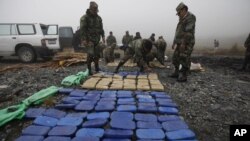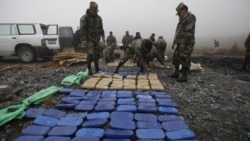The illegal global economy is big business. Loosely defined as a network of international trade relationships that bring goods, service, and people across borders in defiance of the laws, it is largely conducted by transnational organized crime networks.
The illegal global economy constitutes illicit transnational endeavors that range from drug trafficking, smuggling of migrants, human trafficking, money-laundering, trafficking in firearms, counterfeit medicines and consumer goods, to intellectual property, wildlife and cultural objects, and even some aspects of cybercrime. The United Nations Office on Drugs and Crime estimates that in 2009 alone, transnational organized crime raked in some 870 billion dollars.
“As humans,” said David Luna, Director for Anticrime Programs at the Bureau of International Narcotics and Law Enforcement Affairs in the United States Department of State, “we underestimate the risks of long-term events that affect us every day in small ways, adding up to a major impact. Illicit trade is one of these risks.”
Speaking before the Organisation for Economic Co-operation and Development in Paris, Mr. Luna said that in order to combat illicit trade, the risks and costs must be understood. The illegal economy undermines public health, creates opportunities for extortion and subversion among government officials, and deprives governments of vital revenue, thus robbing the citizenry of needed public services. It kills directly by selling counterfeit concoctions as life-saving medications, and as it expands, it shrinks the legitimate economy.
“When illicit trade, blood money, and corruption converge to create permissive sanctuaries, safe havens, and illicit financial hubs, insecurity and destabilization in some parts of the world can have a devastating ripple effect that threatens our shared agenda for enduring peace, prosperity, and market stability,” said Mr. Luna.
“No single government or company can design and implement an effective solution to this complex problem alone, nor does any single entity have a complete understanding of how vast the problem really is,” he said.
“But through collective action and a multi-sector approach, we could strive to shut down the global illegal economy and help communities to nurture transformative and sustainable markets. Instead of harmful counterfeits and illicit products that pose health hazards to our people, we could work together to build more dynamic economies focused on innovation, competitiveness, and, above all, a brighter future.
The illegal global economy constitutes illicit transnational endeavors that range from drug trafficking, smuggling of migrants, human trafficking, money-laundering, trafficking in firearms, counterfeit medicines and consumer goods, to intellectual property, wildlife and cultural objects, and even some aspects of cybercrime. The United Nations Office on Drugs and Crime estimates that in 2009 alone, transnational organized crime raked in some 870 billion dollars.
“As humans,” said David Luna, Director for Anticrime Programs at the Bureau of International Narcotics and Law Enforcement Affairs in the United States Department of State, “we underestimate the risks of long-term events that affect us every day in small ways, adding up to a major impact. Illicit trade is one of these risks.”
Speaking before the Organisation for Economic Co-operation and Development in Paris, Mr. Luna said that in order to combat illicit trade, the risks and costs must be understood. The illegal economy undermines public health, creates opportunities for extortion and subversion among government officials, and deprives governments of vital revenue, thus robbing the citizenry of needed public services. It kills directly by selling counterfeit concoctions as life-saving medications, and as it expands, it shrinks the legitimate economy.
“When illicit trade, blood money, and corruption converge to create permissive sanctuaries, safe havens, and illicit financial hubs, insecurity and destabilization in some parts of the world can have a devastating ripple effect that threatens our shared agenda for enduring peace, prosperity, and market stability,” said Mr. Luna.
“No single government or company can design and implement an effective solution to this complex problem alone, nor does any single entity have a complete understanding of how vast the problem really is,” he said.
“But through collective action and a multi-sector approach, we could strive to shut down the global illegal economy and help communities to nurture transformative and sustainable markets. Instead of harmful counterfeits and illicit products that pose health hazards to our people, we could work together to build more dynamic economies focused on innovation, competitiveness, and, above all, a brighter future.






